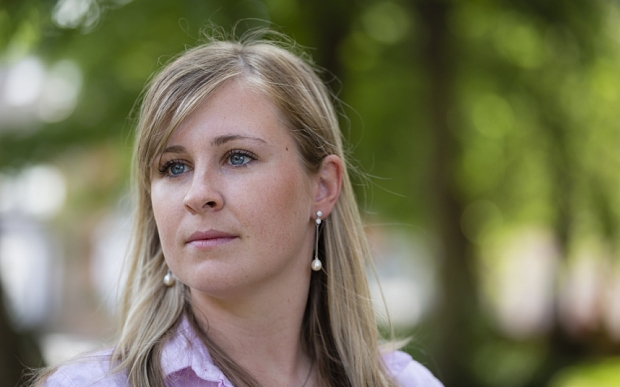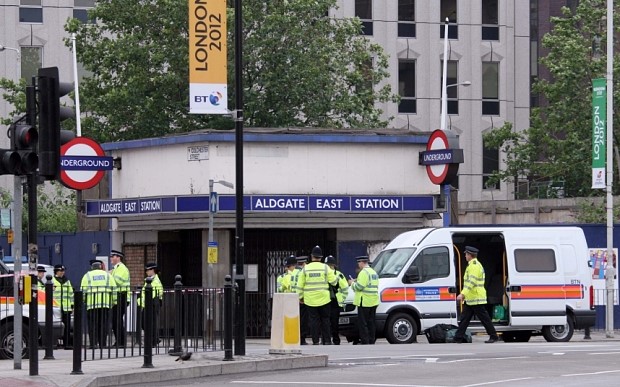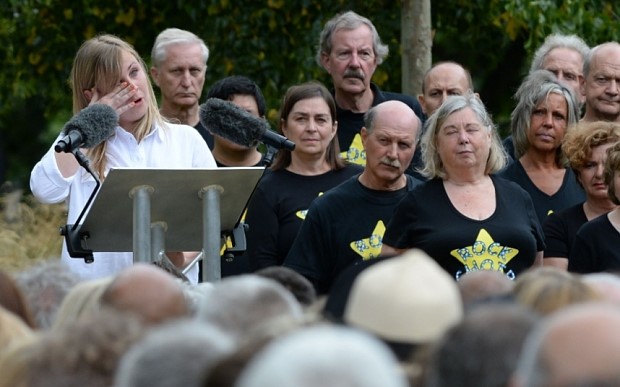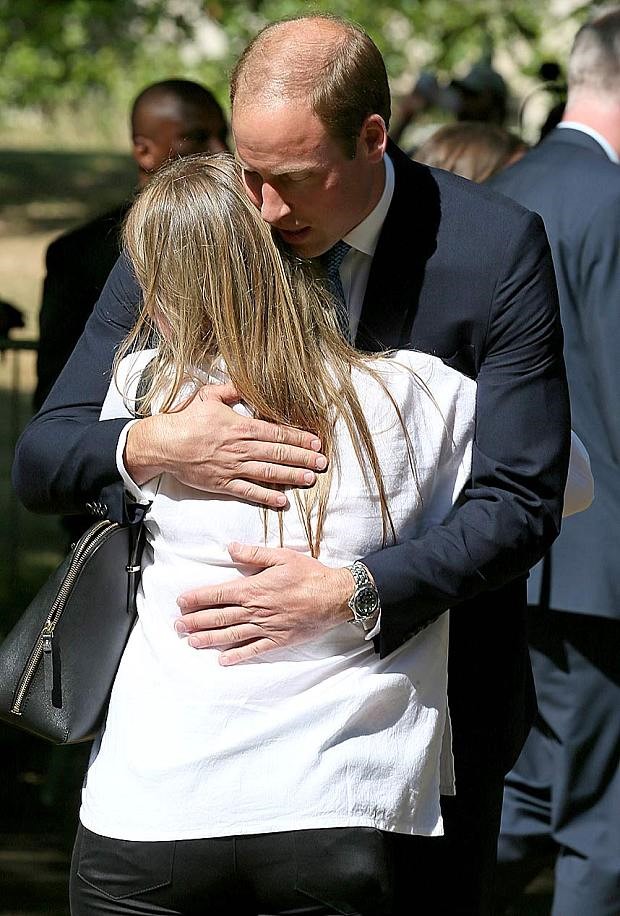Victoria Lambert Telegraph
‘It may not have broken London,” said the soberly dressed young woman, voice wavering as she addressed those gathered in a heat-drenched Hyde Park to commemorate the 10th anniversary of the 7/7 terrorist attacks, on Tuesday. “But it did break some of us.”
The message of 24 year-old Emma Craig – that a decade on, the terrorists’ actions still cast shadows on the lives of those lucky enough to escape – was all the more poignant, given last month’s attacks on British holiday makers in Tunisia.
One of the youngest to walk away from the attacks that struck London in 2005, physically unscathed, it took Emma years to admit to herself how much the atrocity still scarred her. Even longer to share her story in private, let alone public, as she did last week.
But her frankness will be an abiding memory of the ceremony for those who watched her speech from home, not just those there, wiping tears of recognition. The Duke of Cambridge was moved to spontaneously embrace her after she left the stage, telling her to “never give up”.
The uncomfortable truth is that Emma’s words cut a stark contrast with the received wisdom we cling to in the aftermath of a terrorist attack: that it is our duty to show strength, rather than admit weakness, so life can go on.
If her message seems bleak – refusing as it does some sort of pat happy ending – Emma, who still lives in London, working in marketing, is unapologetic. “It was the elephant in the room,” she says. “What I went through pales into comparison with the experience of those who lost a loved one or were injured. But I will never forget that day – as I know hundreds of others who were there can’t. We’ve been left with a sort of survivor guilt, which is very difficult to acknowledge or talk about.”
Emma was just ten days shy of her 15th birthday when the tube she was travelling on was hit by the first bomb at 8.50am on 7th July 2005, in the tunnel between Liverpool Street and Aldgate stations. Although she escaped physically unscathed, unlike the 52 Britons who sadly died and hundreds more who were injured, the terrible memories of that morning have never left her.
Still a school girl, taking her first, tentative steps into adult life that summer, Emma was almost at the end of a two-week work experience placement at a law firm in the City. Each day, she had shared the tube journey in from their north London home with her mum, who got off a stop early that morning to change trains. “She asked if I was OK to go on by myself, and I joked, ‘Go away, Mum’, then put my headphones back in. I was really enjoying that feeling of being grown up, wearing smart clothes, buying my own sandwiches at lunchtime.”
Neither she, nor her mother, could have imagined what would happen as her tube lurched on. “There was this ground-rumbling sound, not a smash but something deeper, and I looked up to see the commuters who had been standing around me lying on the floor,” recalls Emma. Unbeknown to her, in the next carriage along, Shezhad Tanweer had detonated a bomb, killing seven people along with himself.
“The air immediately filled with soot, blackening the carriage. I’m not sure if the lights had gone out, but it was difficult to see. Difficult to breathe, too – the air felt thick, and smelt cloying, like night air full of sulphur after a Guy Fawkes party.”
Frozen in shock, while panic erupted around her, Emma has no idea how long they were stuck before queuing in a very orderly, British fashion, for firemen to help them out of the carriage. “As I walked up the track, a fireman asked if I was OK. I think I said I was fine, and he said, ‘I can see you’re not’ and went with me. I think I thought that no one would see me as a child as I was wearing my smart office clothes.”
As Emma reached the platform, and word spread of the bomb, her mobile rang – her mum, checking if she was ok. “I said, ‘Mum, I was on the tube, I was there’.” She just said, ‘Sugar’ – in a long drawn-out breath, and then, ‘I’m on my way’. I think that was when I started crying and crying.”
The memory that comforts Emma most is the generosity of those who rushed to help, above ground. ”People came out from offices and shops, with hot drinks, water and food, and paper towels to wipe our faces, anything they could find. Staff came out of a Chinese restaurant with a silver trolley, bringing coffee and tea in a samovar. London looked after London.”
Emma had cried so much, her head was pounding: ”And then mum appeared, and she cried and hugged me.’’
The pair walked to meet Emma’s father, who was working in the City too, and the trio embraced before beginning the three-hour walk home. Emma’s memories are of feeling anaesthetised: ”I couldn’t comprehend that people had died. I wanted urgently to know everything that had happened, yet I also couldn’t process it. It was apparent that who lived or died that day was just down to cruel luck.”
In the following days and weeks, Emma was numb. “I think it was hard for my parents; it’s difficult to understand how to act in this situation, you can’t read about it in parenting books. And I didn’t want to talk about it, even though I was reading up on it frantically.”
Going back on the tube for the first time was difficult, but above all, Emma was desperate for life to carry on as normal. “Back at school, people were coming up to me, saying ‘we were praying for you’ and things like that, but I didn’t want to be different. I wanted to blend back in and not talk. I didn’t want to be known as that girl in the bombings.’’
Craving normality, and achieving it, she admits, were two very different things: “I was watching life rather than taking part – observing what other people were doing and trying to act normal. But I might think to myself: ‘What you are worrying about – boys, school – it’s not important. I’ve seen a lot worse.’ I distanced myself from my peers.”
For the next six years, she wouldn’t talk about the bombings at all – even to her parents. “I felt seeking help would have been a failure especially as I knew people had died – you think, ‘their families’ problems are a lot worse than mine. I should be able to deal with it.’ It was classic survivor’s guilt, looking back.”
Not helped by giving herself so little allowance, for being so young: “Even now, I still struggle with the fact that I was too scared to say words of comfort or take final words to families. I feel I could have helped, even in a 14 year-old’s way.”
It was only in her final year at the University of Leeds, where she was studying German and Russian, that she took the step of approaching a student counsellor: “There was just a realisation that I hadn’t got over this and needed to talk about it,” she says.
Would it have been better not to bottle up her feelings for so long? Emma felt she didn’t have a choice: “When you tell people you are a survivor, you get that ‘look’ – part pity, part awkwardness, sort of ‘I don’t know what to say next’. I hated it,” she says. “I felt people expected me to crack.”
Although she attended memorials on the anniversary of the attacks over the last decade, seeing bereaved families always sparked those feelings of guilt, again: “You know it’s illogical, but you can’t help it.”
It was only last year that she finally got involved with a survivors’ group – and felt affinity to be able to admit that she had suffered, too. “It felt good that people understood; in your own head, those who weren’t there can’t. At the same time, you don’t want them to – because you don’t want them to have gone through it.”’
It was fellow survivor Sudhesh Dahad who suggested she spoke, along with him, at the ceremony. Sudhesh’s speech – in which he described the strain of stoically trying to deny the attack had affected him, in defiance of the terrorists – acknowledged the same uncomfortable truth Emma addressed: that surviving such an event can be both a blessing and burden.
“It took me a good couple of evenings to write the speech,” Emma says. “I didn’t want to do an injustice to anyone else, to offend either survivors or the bereaved families – because I know my experience pales into insignificance into theirs. I felt a lot of pressure – did I have the right to speak out? It seems to be such a taboo; to say you are not OK.”
Afterwards, other survivors who had never felt able to speak up, either, said her speech had done it for them. “Prince William said he had felt honoured to hear it.”
And in acknowledging how her experience scarred her, in ways still not quite healed, Emma has finally assuaged some of her guilt that life, for her, does carry on.
“I feel I must go out and live it, otherwise what a waste. Why did you get to keep your life if you don’t go out and make the most of it? That’s what I need to do.”





